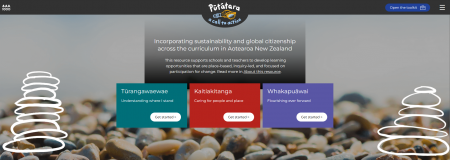ACTIONS
- Protect and safeguard cultural and natural heritage
- Learning and educational opportunities
- Cultural participation/social inclusion
- Sustainable tourism
- Support research
- Employment (recruiting, training, safety)
- Energy consumption, greenhouse gas emissions
- Waste management and reduction
- Transport (forms of, energy use)
- Commercial activities including copyright and IP
- Governance and management
- Security, disaster preparedness, risk reduction
- External partnerships and collaborations
- Toolkit/framework/roadmap
- Sign-post to other resource (database)
- Video
Pūtātara – a call to action
- S. Chiaroni (editor) and S. Hopkinson, Cognition Education developed for the Ministry of Education, New Zealand
“Pūtātara encourages schools and teachers to create learning opportunities that expand learners’ understanding of complex issues and take action for change. The resource is aligned to best practice in local curriculum design, education for global citizenship, and environmental education (best practice as outlined in the Local Curriculum Design Toolkit, Guidelines for Environmental Education in New Zealand, the Learning Framework for 2030 as being developed by the OECD, and UNESCO’s work in global citizenship education).” (About this resource)
Avaiable in
- English
SDGs LINKAGES
The resource is closely linked to SDG 4.7 (Education for Sustainable Development), notably by drawing on Māori cultural perspectives. It can support SDG 4.4 (staff skills), as well as SDG 6.B (involving local communities in the sustainable management of water), 12.8 (information and awareness for sustainable development and lifestyles in harmony with nature) and 13.3 (climate change education and awareness). Ensuring collecting institutions are effective in empowering people to learn in and from their own culture supports SDGs 4.5 (removing barriers in education) and 10.2 (promote universal social, economic and political inclusion.
Click on the SDG Target to discover Our Collections Matter indicators
-
Our Collections Matter indicators:
- Number of young people and adults in skills-development activities and programmes drawing on collections, for employment, decent jobs and entrepreneurship.
- Increase in number of young people and adults in such programmes.
- Number and proportion of staff who have received training in the last year, to better support their contribution to the SDGs.
- Programs and processes in place to ensure the availability of a skilled workforce.
-
Our Collections Matter indicators:
- Number of educational and/or training programmes drawing on collections directed to eliminate gender disparities in education.
- Number of educational and/or training programmes drawing on collections directed to meet the particular needs of persons with disabilities.
- Number of educational and/or training programmes drawing on collections directed to meet the particular needs of Indigenous peoples’ groups.
- Number of educational and/or training programmes drawing on collections directed to meet the particular needs of children in vulnerable situations.
-
Our Collections Matter indicators:
- Numbers of people in each type of programme drawing on collections from different demographic groups.
- Increases in numbers of people in each type of programme from different demographic groups.
- Proportion of people involved in such programmes in relation to overall audience size.
- Evidence that learners have acquired knowledge and skills to promote sustainable development.
-
Our Collections Matter indicators:
- Collections development to support sustainable water management and sanitation for all.
- Number of programmes for local communities directed towards water quality improvement and sanitation management.
-
Our Collections Matter indicators:
- Collections development to ensure that collections effectively meet the needs of all, irrespective of age, sex, disability, race, ethnicity, origin, religion or economic or other status.
- Number and proportion of educational and participatory programmes that promote participation irrespective of social or other status.
- Numbers and proportions of people making use of collections in relation to the demographic of the local population.
- Numbers and proportions of people involved in focused programmes aimed at promoting social, economic and political inclusion.
- Numbers and proportions of people from different demographic groups involved in decision-making processes relating to collections and collections-based institutions.
- Number and types of partnerships that build relationships with marginalized groups, individuals and communities.
-
Our Collections Matter indicators:
- Extent to which (i) global citizenship education and (ii) education for sustainable development (including climate change education) are mainstreamed in (a) national education policies; (b) curricula; (c) teacher education; and (d) student assessment.
- Extent to which global citizenship education and education for sustainable development (including climate change education) are mainstreamed in formal, informal and non-formal education programmes and activities drawing on and related to collections.
-
Our Collections Matter indicators:
- Plans in place to enhance positive contributions to addressing climate change through use of collections. Plans in place to ensure collections, collections institutions and broader society can adapt effectively to climate change.
- Plans in place for effective education and awareness raising on climate change mitigation, adaptation, impact reduction and early warning.
- Plans in place to reduce negative contributions of collections-related functions, e.g. measuring greenhouse emissions with plans and targets in place to reduce them.

